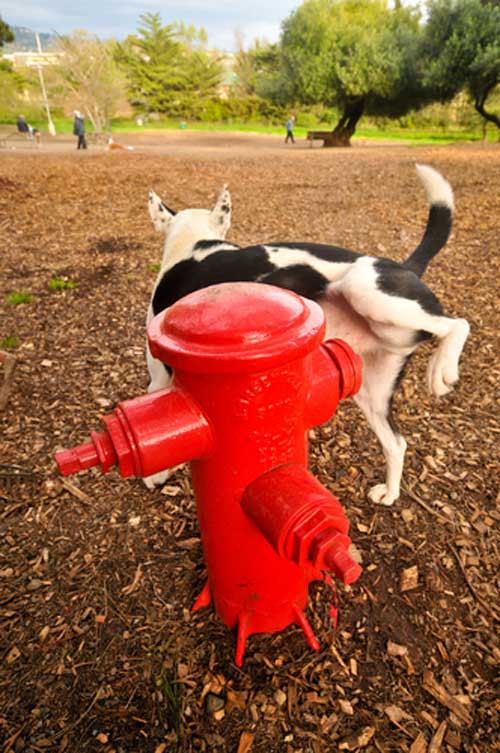Let’s face it, dogs pee on just about everything… But did you know that frequent urination, combined with signs of dehydration, blood in urine and pain in the lower body can mean trouble for your dog’s kidneys?
Just like in our bodies, your dog’s kidneys are very busy balancing out certain substances in the blood, maintaining normal concentrations of salt and water in the body and filtering out the bodies waste as urine. Kidneys also help to control blood pressure and even create a hormone that encourages red-blood cell production. What we are getting at here is that your dog’s kidneys are extremely important to their overall health.
It is important to begin treatment of kidney disease at the first sign for the most effective results. Treatments will vary depending on whether the you are dealing with an acute or chronic case.Treatments may include dialysis, diet management, fluid therapy and management of blood pressure. Medication may also be used for gastrointestinal problems and to help manage high blood pressure. Kidney failure in dogs if life threatening and it’s important that you contact your veterinarian immediately if you think your dog is suffering from it.
Ailment Guides:
Glaucoma In Dogs
Hair Loss In Dogs
Cbd Oil For Panosteitis In Dogs And Puppies
Canine Kidney Conditions
Causes of Canine Kidney Failure
Kidney disease or kidney failure in dogs can be acute or chronic, meaning it can happen over a period of days or over a period of months or even years.
Some causes of acute kidney failure include:
- Ingesting toxins
- Reaction to medication
- Tainted food
- Infections
- Urinary obstruction
- Decreased blood flow or oxygen to the kidneys
As a dog owner, you can help prevent some acute causes of kidney failure by keeping your dog away from poisonous products around your house. You should also never give your dog over-the-counter medication for humans without first consulting your veterinarian. Making sure fresh drinking water is always available will also help to insure your dogs kidneys stay in strong working condition.
Because chronic kidney disease develops over a long period of time, it’s causes can be harder to determine. Congenital and hereditary conditions are often to blame and that is why you usually see this condition in older dogs. It is often a symptom of another underlying illness.
Learn More:
Tips On Using Cbd Oil To Treat Your Pets
What Type Of Animals Can Benefit From Cbd Oil
Can Benefit Dogs Cbd For Dogs And How It Can Change Your Pets Quality Of Life
Signs of Kidney Failure in Dogs:
There are several signs that your dog may be suffering from kidney problems. If your dog is showing any of the following symptoms, it is best you visit your veterinarian right away as dog kidney disease can lower life expectancy by a significant margin. The most common/obvious symptoms of renal failure in dogs are:
- Loss of appetite
- Change in water consumption
- Change in volume of urine produced
- Pale gums
- Balance issues
- Depression or lethargy
- Foul breath
- Vomiting
- Weight loss
- Bloody urine
- Ulcers in the mouth
A valuable diagnostic tool for kidney failure is a urinalysis, testing and analyzing the pH. Veterinarians will give a very thorough physical examination to look for swelling in the abdomen as well as potential growth or tender areas. If there is concern that it may be a tumor, an ultrasound or x-ray may be ordered at that time.
CBD Oil for Canine Kidney Support
CBD – or Cannabidiol – can be very effective at limiting the causes of infections, and therefore reducing the risk of kidney failure.
Cannabidiol (CBD) can be very beneficial for maintaining your dog’s immune system, cardiovascular system and overall vitality. CBD helps to lessen the effects of lethargy, gastrointestinal issues and reduces anxiety, aggression and stress-related disorders.
Think of CBD as a supplement that can reduce the severity and frequency of many symptoms of kidney conditions. It can be ingested, under the tongue, or applied topically to the affected areas. When ingested, CBD can soothe irritation, inflammation and reduce pain associated with gastrointestinal infections, bladder infections and weakened kidneys.
Cannabidiol is a phytocannabinoid that has been shown to have a prominent effect on numerous ailments – including epilepsy, arthritis and cancer. Remedies containing CBD achieve this by interacting with your dog’s endocannabinoid system. Almost all animals, like people, have an endocannabinoid system; this network of neurotransmitters is integral to physiological processes like memory, mood, pain, stress and appetite.
This complex biosystem is very prevalent in dogs in comparison to other species. Canines have a high concentration of CB1 & CB2 receptors in their brainstem. CB1 receptors affect the brain, lungs, vascular system and muscles, gastrointestinal function; whereas, CB2 receptors are linked to bones, skin spleen and glial cells. In combination, CB1-CB2 collaborate in influencing the overall immune system, liver, kidneys, bone marrow, pancreas and brainstem.
CBD can help your dog by producing anti-inflammatory, anti-anxiety, antipsychotic, antispasmodic and analgesic effects indirectly – that is, CBD interacts with your dog’s ECS (Endocannabinoid System) opposite to THC which directly binds to the Cannabinoid Receptors of the body. This does two things: makes the positive remedial properties more bioavailable to your dog; and lessens or negates the psychoactive effects, such as those associated with THC ingestion.
As you can see by the scope of ailments that are affected by CBD, it is clear how introducing CBD into your dog’s routine can benefit their internal & external health.
Ailment Guides:
Staph Infections In Dogs
Canine Parvovirus
Bronchitis In Dogs
FAQ’s
How long can a dog live with kidney failure?
When treated and monitored effectively, your canine can live numerous years through the various dog kidney failure stages. Your dog will likely have to follow strict diets, medications or treatments schedules to avoid worsening their condition, but dogs suffering from kidney failure can certainly live their lives quite well.
Is kidney failure in dogs painful?
Kidney failure or damage to the kidneys can results in a number of painful symptoms, such as sharp abdominal pain, soreness or stiffness in the lower back/haunches, painful vomiting or frequent/painful urination.
What are the signs of dying from kidney failure?
The signs & symptoms that your dog is suffering from kidney failure range from very obvious to subtle. On the more serious end of the spectrum, painful urination, back/haunch pain, severe nausea or vomiting, inflammation in the lower abdomen and legs, and lethargy/fainting can occur. Symptoms like insomnia, shortness of breath, loss of appetite, irritated skin, and swelling are some of the more minor signs for kidney failure.
Can a dog recover from kidney failure?
Acute kidney failure can lead to premature death within several days or weeks, but less severe cases of renal failure can be treated and managed for years. Strict diets, intravenous treatments and supplements can support your dogs kidneys and help them to manage the damage to these vital organs.
What is renal failure in dogs?
Renal failure – typically referred to as Chronic Renal Failure (CRF) – occurs when your dog’s kidneys are unable to filter waste & toxins from the blood. This condition does not always interfere with your dog’s ability to urinate, but it can encompass blood in the urine in addition to severe pain.










